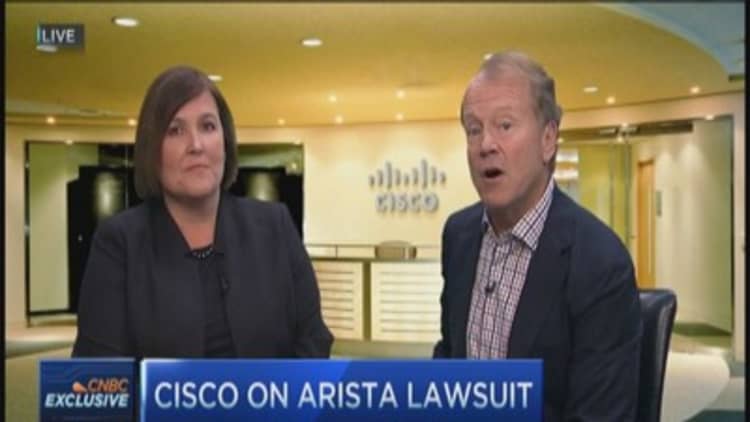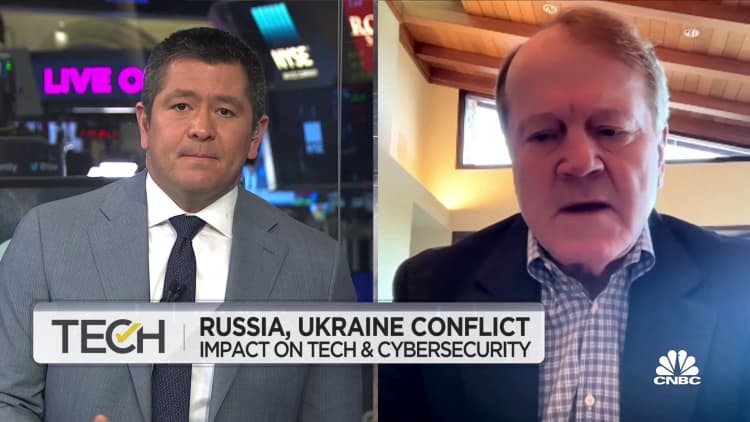Cisco ex-CEO John Chambers is taking on his former company with new networking startup called Nile
Nile’s founders, John Chambers, left, and Pankaj Patel, have worked together for almost 25 years.
Nile
In his two decades running Cisco, John Chambers turned a computer networking upstart into one of the world’s most dominant tech companies, with close to $50 billion in annual revenue and giant customers across the globe.
Now, seven years removed from selling switches and routers, Chambers is challenging his former employer with a startup that’s coming out of stealth mode on Wednesday. Chambers, 73, has teamed up with ex-Cisco development chief Pankaj Patel to create a company called Nile, which is promising to upend the world of corporate Wi-Fi.
It’s a market that for years has seen Cisco battle it out with Juniper Networks and Aruba Wireless, now a unit of Hewlett Packard Enterprise. Chambers and Patel say that neither Cisco nor its existing rivals have developed the wireless technology needed to meet the demands of the modern-day office, with its swarm of devices, trend toward hybrid work and advanced security threats.
“We’re building something that our prior company was not building,” Chambers said in an interview with CNBC. “It’s a whole new area. It isn’t like we did something, and we’re trying to make it better.”
Nile has raised $125 million in the four years since he and Patel, the CEO, teamed up to start the company, though its funding rounds have remained confidential until now. Through his investment firm, JC2 Ventures, Chambers said he owns 10% of Nile. Other investors include March Capital, 8VC and Iconiq Capital.
Nile’s technology has only been generally available to customers since May, so the company has a long way to go before market share conversations become meaningful. A spokesperson said Nile has 20 production deployments, including at Sprinklr, ThoughtSpot and the University of Missouri-Kansas City.
Nile is pitching a simple user experience, with no need for clients to deal with upgrading hardware. Rather than selling big, expensive boxes — the Cisco model — Nile will charge organizations based on the number of people who use its networking infrastructure each month.
That’s particularly relevant at a time when employers are figuring out their hybrid and remote work plans. Patel says Nile’s services-only offering will save clients 30% to 50% at each location where it’s deployed.
“We are very different,” he said. “We truly align to the number of users on a network. In a building, if there are 250 or 300 users on a given day, we only charge them for the number of people who are using it.”
Nile is far from the first company to attack Cisco and the other hardware vendors with a software-based alternative.
‘Been a buzzword in the industry’
While Chambers and Patel were still at Cisco, multiple Silicon Valley startups raised big venture rounds as they touted an approach called software-defined networking that involved developing advanced software and putting it inside commodity boxes. But the hype never materialized into big new companies as the incumbents, including Cisco, acquired their way into the market.
More recently, Cisco has started allowing customers to pay for networking as a service (NaaS), with the 2021 introduction of what it calls Cisco+. And earlier this year, HPE announced GreenLake for Aruba. However, few large companies have signed up for these sorts of arrangements, said Brandon Butler, an analyst at technology industry researcher IDC.
“Incumbents have tried to do NaaS for a long time,” Patel said. “It’s been a buzzword in the industry forever.”
Chambers says Nile’s approach is to do for networking what Amazon did for storage and computing, allowing people to rent resources and pay for what they use each month instead of requiring them to buy, set up and manage their own hardware. IDC’s Butler said that, within the data center, networking is lagging behind compute and storage in the move toward consumption-based usage.
Nile’s initial product lineup includes access points that distribute Wi-Fi in a facility, access switches that connect to access points and distribution switches that can connect access switches to the internet. The software lets administrators see if the network is functioning properly, learn about issues and monitor performance of applications.
While taking on Cisco is a tall task for any startup, few people are better positioned to know the company’s weaknesses than Chambers and Patel, who have worked together in some capacity for about 25 years. Chambers joined Cisco in 1991, a year after the company’s IPO and, in 1995, took over as CEO, a position he would hold for the next 20 years. Patel spent almost 14 years at Cisco and before that was an engineer at a company that Cisco bought. By the time of his departure, he was among Cisco’s top four executives.
“Whether it’s a public company or a private company, a small or medium or large company, any company is essentially up for grabs as far as we are concerned,” Patel said. “Why? Because anyone in any enterprise, small or large, needs connectivity to do their job.”
Cisco, meanwhile, has been mired in low-growth mode for well over a decade, which includes the tail end of Chambers’ career there. The company hasn’t generated double-digit revenue growth since 2010, coming out of the financial crisis, and has only topped 5% once since 2013.
For Chambers, taking on Cisco carries some irony. As CEO, Chambers was known to make life difficult for his lieutenants who left for a rival company. The most notable example was at Arista, an enterprise networking company co-founded by Andy Bechtolsheim and David Cheriton, who had sold a prior company to Cisco.
In 2008, the duo hired Jayshree Ullal, who had been a top Cisco executive, as Arista CEO. It was a move Chambers took personally. In 2011, according to the Wall Street Journal, Chambers “told executives to keep Arista from winning any new business from Cisco customers.” His sales staff then formed a “Tiger Team” to impede Arista’s “marketing efforts and forestall its initial public offering plan,” the Journal reported.
In 2014, Cisco sued Arista for patent and copyright infringement, setting off a protracted legal fight that ended four years later with Arista agreeing to pay Cisco over $400 million to end the litigation.
Chambers told CNBC at the time of the lawsuit, “We needed to send a message to the market that we will protect our innovation and also protect our customers.” Ullal responded, telling CNBC that Arista was “definitely blindsided and disappointed.”

“John should have at least picked up the phone and called me,” Ullal said at the time. “Instead it was in the press, and we only got it five days later.”
When asked about the comparison between what ex-Cisco executives did in the past and what he’s doing now, Chambers called it a “fair question.” He said that he and Patel have been out of Cisco “for many years” and have done roughly eight startups together since then. He said Nile is going after a market in transition that all the incumbents have failed to change on,” and he added, “I’ve always believed your competition always comes from below.”
Chambers also brought up another Cisco alum, who left the company to build a thriving competitor called Zoom. Eric Yuan, Zoom’s founder and CEO, had joined Cisco in 2007 through the acquisition of WebEx. He left Cisco in 2011 after failing to get traction internally for his effort to build a more modern video-conferencing system.
Yuan started Zoom, which became a household name during the pandemic because of how easy its video chat software was to set up and use on any device in the office, at home or on the move. Chambers is highly complimentary of Yuan and even uses Zoom for his virtual meetings (including this one).
“He was very creative,” Chambers said, of Yuan. “I wish we’d been faster on our feet to balance that.”
WATCH: ‘If you’re thinking about investments now, I would think cybersecurity companies,’ says John Chambers

For all the latest Technology News Click Here
For the latest news and updates, follow us on Google News.

